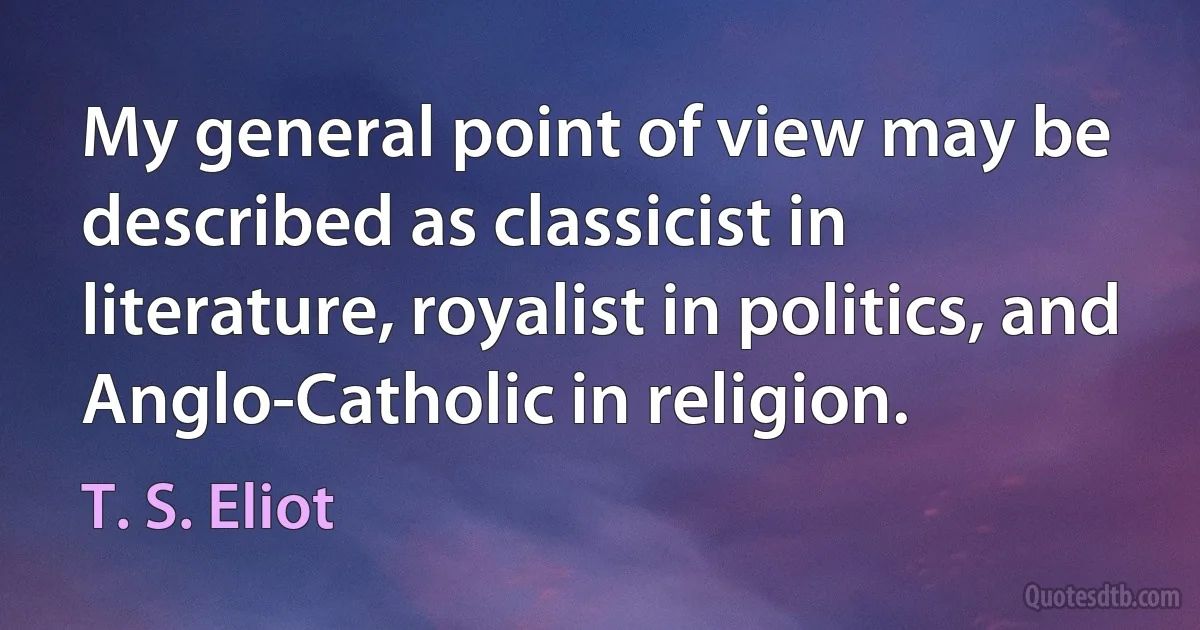Classicist Quotes
Yes, yes, a formula that's a straitjacket.... not for me! All the same, he tries in vain, does Jean-Dominique [Ingres], to wring your heart with his glossy finish! I said this to Vollard, to shock him, he is very powerful! Nevertheless he [ Jean-Dominique Ingres, French classicist painter] is a damned good man... The most modern of the moderns. Do you know why I take my hat off to him? Because he forced his fantastic draughtsmanship down the throats of the idiots who now claim to understand it. But here there are only two: Delacroix and Courbet. The rest are scoundrels.

Paul Cézanne
When I was young, I thought I was the best formalist of my time. I thought I was a revolutionary. When the big problems would come, I would solve them and write about them. The big problems came and passed by, others solved them and wrote about them. I was a classicist and not a revolutionary.

Wolfgang Pauli
Yes, I'm profoundly a representative of the great hypervirtuosic Romantic epoch. But as already mentioned, my roots also go back to Bach and this special style of interpretation, where I'm also at home. In this special field of tension I also see many of the major composers and works in the Romantic tradition. It was no less than Schumann himself who said that great music finds all its combinations in Bach. Indeed, Schumann also builds up his works in polyphonic style, and even in his orchestral scores and symphonic movements he is a counterpointer. As Romantic and modern his work must have seemed to people of his era and lifetime, in main he was a classicist. That means that - and only to name one typical Romantic composer - Schumann cannot be understood without Bach.

Burkard Schliessmann
The natural sciences did not advance in virtue of the universal appeal of rationality. Their theological, classicist and metaphysical opponents were not converted but displaced. All the ancient universities had to be compelled by outside pressure to make room for science; and most nations began to appreciate it only after succumbing to the weapons produced with its aid. To cut a long story short, scientific method has triumphed throughout the world because it bestowed upon those who practised it power over those who did not. Sorcery lost not because of any waning of its intrinsic appeal to the human mind, but because it failed to match the power created by science. But, though abandoned as a tool for controlling nature, incantations remain more effective for manipulating crowds than logical arguments, so that in the conduct of human affairs sorcery continues to be stronger than science.

Stanislav Andreski
In my own work, I'd say I'm a classicist, but I look everywhere for my solutions. I don't study the toilet-living habits of my clients, although that's a popular approach. First, I think of every building in history that has been similar in purpose. Then I think of the functional program - that's a major part of the study.

Philip Johnson
Cyril Chantler, one of Britain's wisest doctors, likes to give people a photocopy of Enoch Powell's book on medicine and politics and tell them that it's the best thing ever written on the NHS. Younger readers may not have heard of Enoch Powell, but he was a Tory minister of health in the early 1960s. He is most famous for his racist "rivers of blood speech," and I can remember protesting outside his Belgravia home. Could he really have written the best book on the NHS? I think that Cyril is right. One of Powell's strengths is that he was a distinguished classicist and writes beautifully, with directness, clarity, and wit: it's like reading Tacitus on the NHS. Another strength is his inability to dissimulate; the source of his catastrophic speech, his weakness as a politician, and his most famous observation that "all political careers end in failure."

Enoch Powell
![It is odd that Edouard [Manet] with his reputation as an innovator, who has survived such storms of criticism, should suddenly be seen as a classicist. It just proves the imbecility of the public, for he has always been a classic painter. (Berthe Morisot)](https://cdn.quotesdtb.com/img/quotes_images_webp/73/berthe-morisot-classic-classicist-303273.webp)

